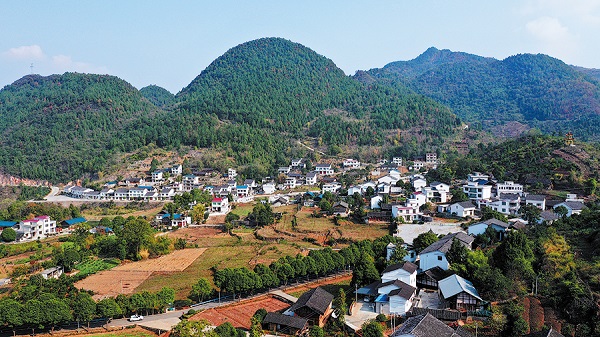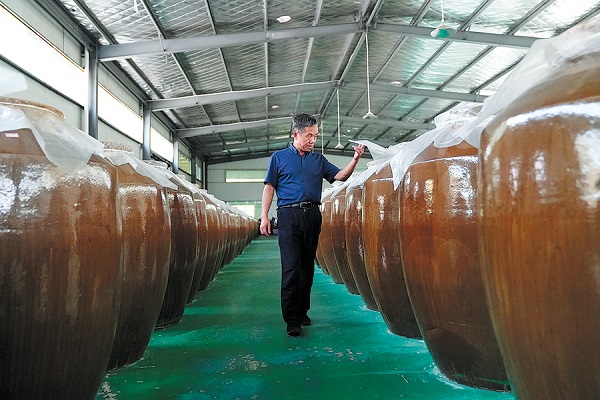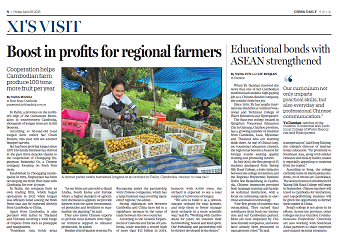Party secretary propels village into prosperity

An aerial photo shows Qinggangba village at the foot of the Wuling Mountains in Sinan county, Guizhou province. SUN LEI/FOR CHINA DAILY
Qinggangba, a village near the Wuling Mountains in Sinan county, Guizhou province, that was once known only for its poverty, has become an affluent village envied by its neighbors partly thanks to the efforts of its Party secretary.
There was a popular folk song that described how poor the village was. The lyrics go like this: "Two out of three years there's no yield, and no one wants to marry their daughters off to this land."
Due to infertile land and scarce water resources, the per capita income of the villagers in Qinggangba was less than 1,000 yuan ($137.60) a year two decades ago, with most families struggling to make ends meet.
Leng Chaogang's family, however, was an exception. Seizing the opportunities brought by China's reform and opening-up, Leng earned over 100,000 yuan a year running a grocery store and selling agricultural supplies. At that time, he was the richest man in the village.
Despite his wealth, Leng didn't feel much happiness.
"Seeing my fellow villagers struggling in poverty, I decided to do something for them," he said.
In 1999 at age 36, Leng was elected chief of Qinggangba by the villagers, who were eager to escape poverty. In 2004, he was elected Party secretary of the village.
Since then, Leng has given up his own business and dedicated himself to finding a path to prosperity for the other villagers.
"To lift the villagers out of poverty, the first step was to change their traditional mindset," he said.
Due to a lack of water, the village's rice crops often failed. So he tried planting crops such as watermelon, chiles and garlic — which were more economically viable and suitable for growing in a water-scarce environment — on his own land.
After achieving success, Leng shared his experiences with the villagers, taught them planting techniques and even mortgaged his own property and used the money to buy seeds and fertilizer for the villagers.
Today, the village grows 66.7 hectares of specialty crops, including garlic and chiles, sales of which have become one of the main sources of income for the villagers.
In addition, under Leng's leadership, the village collective established a cattle breeding farm that sells over 50 head of cattle annually, with a total output value of about 800,000 yuan.

Leng Chaogang inspects a food processing factory in Qinggangba village in Sinan. SUN LEI/FOR CHINA DAILY
"Thanks to Secretary Leng's leadership, life is much better now than before," said villager Zhao Xiangyong, who works at the cattle breeding farm. "The salary at the cattle farm alone is more than 3,000 yuan a month."
In recent years, the village collective has also established an agricultural product processing factory, an office paper processing factory, a forest resort and a labor service company.
All 945 residents from 235 households in Qinggangba are benefiting from the village's development, with their incomes coming from multiple sources, including land rentals, wages from working in the village and collective dividends.
The village collective's fixed assets and working capital now amount to 70 million yuan, and its annual economic income is 3 million yuan. The villagers' per capita net income has climbed to 19,200 yuan per year, according to Zhao Xiaohu, deputy Party secretary of the village.
Qinggangba is now renowned in the region for its wealth and job offerings, with many neighboring villagers seeking employment opportunities here.
Leng said the secret to the village's success was leveraging the role of the grassroots Party organization.
"The power of one person is ultimately limited," he said.
The village's Party branch continues to develop young people with ideas, skills and enthusiasm into members of the Communist Party of China. These young Party members have played an important role in key positions that are driving the economic development of the village's industries.
As the villagers become wealthier, Leng, who relies on his salary as a village cadre to support his family, has a lower standard of living than many of his neighbors. But he said he is not concerned about this.
"Although my income is not as much as it was 20 years ago, I am now the one with the highest level of happiness in the village," he said.
Wang Hui contributed to this story.
All rights Reserved. 京ICP备13028878号-8







 Overview
Overview Guiyang
Guiyang Guian New Area
Guian New Area Liupanshui
Liupanshui Anshun
Anshun Qianxinan
Qianxinan Qiandongnan
Qiandongnan Qiannan
Qiannan Zunyi
Zunyi Tongren
Tongren Bijie
Bijie Guizhou commits to culture preservation and rural vitalization
Guizhou commits to culture preservation and rural vitalization Guizhou voice at 2025 national two sessions
Guizhou voice at 2025 national two sessions Meet the 'genius moms' at Shenzhen cultural fair
Meet the 'genius moms' at Shenzhen cultural fair 

